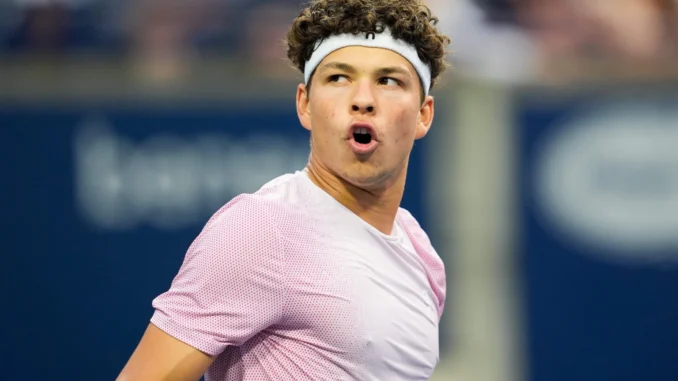
Ben Shelton, the 22-year-old American tennis star whose explosive serve and charismatic presence have made him a standout on the ATP Tour, has brought attention to a pressing issue that has become a hot topic among players: the grueling physical and mental demands of the professional tennis schedule. Speaking after his fourth-round victory at the 2025 Canadian Open in Toronto, where he battled past Italy’s Flavio Cobolli in a thrilling 6-4, 4-6, 7-6(1) match, Shelton expressed concern about the toll of the relentless tour calendar. “It’s something every player is talking about now,” Shelton said, highlighting a shared sentiment among his peers about the need for better balance to sustain career longevity and mental health. As he prepares for the Cincinnati Open and the US Open, Shelton’s candid remarks have sparked a broader conversation about the future of the sport.
Shelton’s rise has been meteoric since turning pro in 2022 after a stellar college career at the University of Florida, where he clinched the 2021 NCAA team title and the 2022 NCAA singles championship. Now ranked world No. 7, a career-high achieved on July 28, 2025, he has solidified his status with two ATP Tour titles, including the 2023 Japan Open and the 2024 U.S. Men’s Clay Court Championships, and semifinal appearances at the 2023 US Open and 2025 Australian Open. His powerful left-handed serve, often clocking over 130 mph, and dynamic playing style have drawn comparisons to legends like Andy Roddick, whom Shelton admires. “It’s pretty cool to be mentioned in the same sentences as him,” he said of Roddick, noting the former world No. 1’s guidance through his father, Bryan Shelton, who coaches him and reached No. 55 in the ATP rankings in the 1990s.
The issue Shelton highlighted centers on the ATP Tour’s demanding schedule, which includes 60 tournaments across 30 countries, with players often competing week after week with little downtime. The physical strain of best-of-five-set matches at Grand Slams, combined with the mental fatigue of constant travel across time zones, has led to burnout concerns. “You’re out there grinding, and it’s not just the matches—it’s the travel, the time changes, the pressure to perform every week,” Shelton explained post-match in Toronto. He pointed to recent injuries among top players, such as Jannik Sinner’s elbow scare at Wimbledon and Carlos Alcaraz’s ankle issue in Madrid, as evidence of the toll. Shelton himself has battled minor wrist discomfort this season, though he credits his father’s coaching for emphasizing recovery strategies.
Players across the tour echo Shelton’s concerns. Casper Ruud, who praised Shelton’s game in 2022 after a Cincinnati loss, noted the challenge of maintaining peak performance: “It’s tough to stay at your best when you’re playing 80 matches a year.” Posts on X reflect similar sentiments, with fans and analysts noting that the packed calendar, including ATP 250s, 500s, Masters 1000s, and Grand Slams, leaves little room for rest. The ATP’s recent decision to extend Masters events like Madrid and Rome to two weeks has drawn mixed reactions, with some players appreciating the extra recovery days but others, like Shelton, arguing it stretches the season further. “We’re all talking about how to make this sustainable,” Shelton said, suggesting that the ATP could explore shorter tournaments or mandatory rest periods.
Shelton’s own experience underscores the issue. His 2025 season has been packed, with deep runs at the Australian Open (semifinals), Roland Garros (fourth round), and Wimbledon (quarterfinals), where he fell to Sinner in straight sets. “His ball speed is really high. Never seen anything like it,” Shelton said of Sinner, acknowledging the intensity of top-level competition. Despite his success, including a second ATP 500 final in Munich, where he lost to Alexander Zverev, Shelton admitted to feeling the strain. “I’m a critical thinker. I know I’m not where I want to be,” he said, reflecting on the need to balance his aggressive style with smarter shot selection to conserve energy.
As the US Open looms, Shelton’s focus is on peaking at the right time, but his comments have ignited a broader dialogue. Former doubles world No. 1 John Fitzgerald, who called Shelton’s lefty serve an “unfair advantage,” suggested that players like him could dominate if the schedule allowed better recovery. Meanwhile, the ATP has yet to announce concrete changes, though discussions about player welfare, including potential counseling for lower-ranked players, are gaining traction. For Shelton, the path forward involves fine-tuning his game—his backhand and returns remain areas of focus—while advocating for a tour that prioritizes player health. With his infectious energy and bold voice, Shelton is not just a rising star but a catalyst for change in a sport at a crossroads.
Leave a Reply